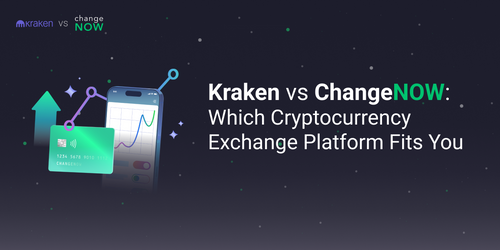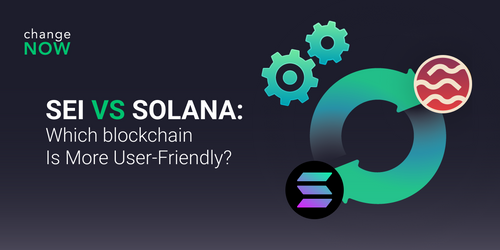Is Crypto Traceable? Crypto Privacy and Anonymity Explained
Cryptocurrency enthusiasts promote the idea of a private and completely anonymous way of managing our finance as an alternative to the traditional and imperfect banking system.
With crypto, you can rest assured that nobody has control over your assets, and you’re the only person in charge. Banks or governments can’t mess with digital currency that is safely stored on your cryptocurrency wallet. Bankruptcy or frozen accounts won’t affect your assets either.
But since cryptocurrencies are the product of the blockchain architecture, there are a few things that don’t go well with each other. When storing data on distributed ledger, privacy, anonymity, and data protection are not absolute and have their own peculiarities.

Is Crypto Traceable?
There is no such thing as absolute anonymity when conducting any type of financial operations online. And cryptocurrency transactions are no exception. Whenever you make a transaction, your data is collected and analyzed. Linking your transactions to your credentials can help service providers speed up the settlement process. At the same time, it kills the whole idea of privacy because all your activities are monitored and recorded. With crypto, things are not that different and one cannot say it is one hundred percent anonymous but rather pseudonymous.
Very few coins offer you complete privacy, and Bitcoin itself is far from being anonymous. To start with, it is almost impossible to buy cryptocurrency without providing your ID. Some exchanges offer no-KYC purchases, but this option is available only for smaller amounts that don’t usually exceed a couple of hundreds USD. And when you use your passport to buy crypto, anonymity is out of the picture.
Since all the legal exchanges are regulated, the government can get access to their records when necessary and track any Bitcoin transaction. Services like Chainalysis – it works with Bitcoin, Ethereum, Litecoin, and Bitcoin Cash – help trace transactions and link them to people who made them.
Bitcoin and most other coins won’t guarantee your anonymity unless you use special services to trick the system. For example, crypto mixers (or crypto tumblers) allow you to “mix” your coins with transactions of others and get new “clean” coins. Alternatively, a mixer will substitute your coins with other coins from the wallets hooked to it. Bitcoin mixers are still legal, but they have to be registered, obtain a license to operate, and comply with the AML policy.
Top Privacy Coins
Cryptocurrency community is known for being passionate about privacy and freedom. That’s why enthusiastic developers created several coins that are focused on keeping their owners anonymous. Typically, they also offer advanced security and are partially or almost fully private. Let’s take a look at some of the most popular privacy-oriented coins.
Monero (XMR)
One of the oldest privacy-focused coins, Monero, is using such technologies as ring signatures and stealth addresses to make its transactions untraceable.
Ring signatures allow a sender to hide their identity from everyone else in the group. When signing a Monero transaction, the sender's private and public keys are combined; that helps to make the transaction unique and private. Randomly generated single-use stealth addresses bring on some extra privacy for the receiving side.
This way neither sender nor receiver are exposed when they transact in the Monero ecosystem. The amount of the transaction stays hidden, too, due to the use of the RingCT technology.
All Monero’s transactions are private, and you cannot send a transparent transaction even by mistake, which makes it the most anonymous coin on the market.
Zcash (ZEC)
The second largest privacy-oriented cryptocurrency is Zcash. Unlike Bitcoin, Zcash enables semi-transparent processing to reveal transaction data selectively. The coin uses a Zero-Knowledge Proof cryptographic tool: it helps to prove that a statement is true without revealing this statement. So, in the Zcash network, a transaction can be confirmed without disclosing its details. It also allows its users to shield transactions. This way you don’t need to know anyone’s address to send or receive Zcash tokens. The transaction amount stays hidden, too.
Dash (DASH)
Another famous privacy cryptocurrency, Dash, enables users to choose if they want their transactions to be anonymous or not. Thanks to the PrivateSend feature, you can hide only some of your transactions or keep them open if the regulatory framework of your region requires you to do so.
To reach consensus, Dash uses a modified version of Proof of Stake – the X11 algorithm. This algorithm is not based on the concept of mining and uses a system of Masternodes (stakeholders) to validate transactions. Dash’s Conjoin mixing tool shuffles transactions and enhances privacy.
For obvious reasons, governments are not the biggest fans of privacy coins. These coins are usually associated with criminal activities on the darknet. Some countries prohibit listing privacy coins on cryptocurrency exchanges, but they are still not banned officially.
And yet there’s nothing bad about privacy, and anonymity is not a crime. Everybody (and cryptocurrency and cryptography enthusiasts in particular) loves their privacy, and it’s only fair that such coins exist.
Specifics of Data Protection
Blockchain is a technology meant to protect your data from manipulation. All the records are public and immutable, so you stay confident that nobody will mess with them. Blockchain copies data, and stores it in many places (nodes) instead of keeping it centralized. The entire copy of the master ledger is stored on every single node of the chain, and these nodes communicate with each other to validate the data and make sure it is accurate and up-to-date.
However, some aspects of blockchain’s architecture might contradict local regulatory requirements. For example, there is a data protection regulation in the EU law – General Data Protection Regulation (GDPR) – which establishes a certain set of rules challenging compliance of the blockchain and cryptocurrency projects operating in the area.
Given that data on the blockchain is distributed to many places, it does not belong to a single owner. This goes against data privacy regulations as it requires a single owner responsible for personal data. A possible solution to this challenge suggests storing index numbers linked to the personal data in a separate database and assigning one owner (for example, an organization) that can be held accountable.
Another big challenge is that blockchain doesn’t provide an option of deleting the data. All the information that has ever been recorded on a blockchain will stay there. The blockchain can change, but it will still have the record of what it used to be before that without the possibility to erase this information. Although it can be useful in some cases, data regulations are strict about the capability of deleting the data of the users whenever there’s a need for that. In this case, storing an encrypted copy of personal data in a separate database would also come in handy.
Bottom Line
Despite popular opinion, Bitcoin and most of the other cryptocurrencies are not anonymous but pseudonymous. They provide their owners with a certain level of privacy but do not guarantee full anonymity. There are services that help track transactions and link them to the senders. Bitcoin mixers and privacy coins are meant to solve the anonymity issue, although they often fall into disfavor of the governments and are considered to be the tools for carrying out criminal activities.
Transparency makes blockchain almost immune to attacks and allows us to store data securely. However, the same characteristics make it difficult to keep our personal data private since it is out there in the open.





